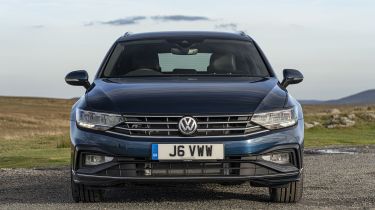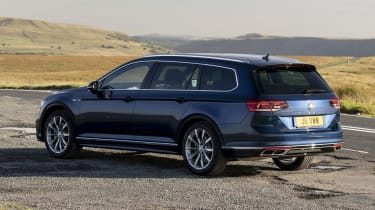Volkswagen Passat Estate - MPG, running costs & CO2 (2015-2024)
The Volkswagen Passat Estate is affordable to run for such a practical model
Life with a Volkswagen Passat comes complete with low running costs and affordable servicing. VW reckons 80% of sales will be to fleet buyers, so it comes as no surprise to find that key models bring you low BiK (Benefit-in-Kind) company-car tax rates. Second-hand prices should be good, too, with the Passat enjoying similar residual values to the upmarket Audi A4 Avant.
Volkswagen Passat Estate MPG & CO2
The 148bhp 1.5-litre is currently the only petrol engine available in the Passat, and it can return anything between 40 and 45mpg depending on trim level and transmission – there’s a choice of six-speed manual or seven-speed DSG twin-clutch automatic. Regardless of gearbox, this engine gets a clever cylinder deactivation feature that automatically cuts two of its four cylinders during light throttle applications.
The old 1.6-litre diesel engine, and its 120bhp 2.0-litre replacement, have both been discontinued. We have always recommended the more powerful 148bhp 2.0-litre anyway – it is more powerful but no less economical, promising 58mpg and CO2 emissions of between 127 and 131g/km. These models, depending on spec and wheel size, fall into an okay Benefit-in-Kind (BiK) tax bracket for company car users.
R-Line models used to be available with a 197bhp version of this engine. Equipped exclusively with the seven-speed DSG, in the real world it’s not much quicker than the 148bhp version, yet delivers poorer fuel economy plus higher CO2 emissions.
More reviews
Volkswagen used to offer a super-quick 237bhp twin-turbo diesel engine on the GT and R-Line specifications, with four-wheel drive and a DSG automatic gearbox as standard. This is no longer available, but if you find one on the used market, beware: this model bumps up the CO2 output and lifts BiK, too. What’s more, this model will return less than 40mpg.
Far more company-car and environmentally friendly, the Passat Estate GTE plug-in hybrid could account for as many as a quarter of sales, according to VW. It gained a higher capacity 13kWh battery pack for 2019, increasing its maximum zero-emissions driving range to between 37 and 38 miles. Paired with a 1.4-litre petrol engine and DSG automatic gearbox, it can officially return up to 256.8mpg and emits well under 50g/km of CO2, qualifying it for low 11% BiK and access to low emissions zones. It takes just over three hours to charge from an AC source, or around five hours from a three-pin plug.
Volkswagen is set to launch a fully electric Passat-sized estate in the next couple of years. It’s not yet known if this will replace the Passat, or sit alongside a new generation.
Insurance group
Insurance groups for the Passat Estate range from 16 for the 120bhp 2.0-litre TDI SE Nav, to group 29 for the range-topping GTE Advance model. Saloon and Estate premiums should be identical.
Warranty
All Volkswagen Passat models have a three-year/60,000-mile warranty as standard. Unfortunately, this is pretty much the minimum buyers have come to expect – Hyundai offers five-year warranties, Kia guarantees your new car for seven and Toyota gives up to 10 years of cover. However, considering 80% of buyers will be company-car drivers, this is unlikely to make much difference, as most of them change their car every three years anyway.
Servicing
Volkswagen offers fixed-price servicing on all models with engines up to and including 2.0-litres – your local dealer will be pleased to give you a quote. Alternatively, you can pay for your servicing on a monthly basis with a Volkswagen Service plan.
Which Is Best?
Cheapest
- Name1.5 eTSI Life 5dr DSG
- Gearbox typeSemi-auto
- RRP£40,640
Most Economical
- Name1.5 TSI eHybrid Life 5dr DSG
- Gearbox typeSemi-auto
- RRP£44,465
Fastest
- Name1.5 TSI eHybrid 272 Elegance 5dr DSG
- Gearbox typeSemi-auto
- RRP£50,870










